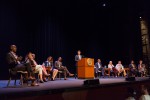Faculty advised students on how to move forward following the election results at an event Thursday.
The Office of Equity, Diversity and Inclusion organized a CrossCheck Live event called “Processing the Election” to help students digest the election and evaluate the election’s potential consequences for students.
CrossCheck Live is a series of moderated discussion panels that aim to address issues such as race, diversity and police brutality.
After Donald Trump was announced president-elect, thousands of students protested in Westwood to express their anger with the result.
The panel featured 11 faculty members, who discussed how students can convert their disappointment into activism.
Lorrie Frasure-Yokley, associate professor of political science, said she thinks the polls were inaccurate because they failed to account for the 2 million white voters from rural areas who did not vote in the 2012 election, but did vote in the 2016 election.
Lynn Vavreck, a political science professor, said people should remember that Hillary Clinton still won the popular vote, in accordance with predictions.
“This is still the same country you thought it was a few days ago,” Vavreck said. “It is just the fact the that way we collect votes together to decide who wins this election was put together in a way that those people in small rural counties and Midwestern states were pivotal.”
[Related: Students protest with campus “Love Trumps Hate Rally”]
Faculty said some groups of students wondered what their futures will look like under the next presidency.
Raja Bhattar, director of the LGBT Resource Center, said more than 400 students flocked to the resource center in the past two days asking the center’s staff how gender rights might change after Trump’s victory.
Law professor Asli Bâli said multiple Muslim students have approached her with stories about feeling unsafe about wearing hijabs or having family travel on airplanes to attend graduation.
Several students asked panelists about what would be the best way to express their disagreements with the election results.
Panelists said students should continue to share their beliefs about what is right and be activists against Trump’s rhetoric.
Tyrone Howard, director and founder of the Black Male Institute at UCLA, said he does not want people to forget how racial injustice, gender discrimination and mass deportation have been underlying problems in the country for the past decade.
“I feel anger about this Trump moment, but I think we have to step back and understand the bigger set of moments,” Howard said. “These (are) issues Trump has only reinvigorated. They are not new.”
[Read more: Full coverage of post-election reactions around campus]
Howard said he thinks students should consider past historical events like the civil rights movement and the women’s liberation movement to guide future activism.
“Often times we look at history, and we think, ‘What was it like to have been there?’” Howard said. “I tell students now, this is your moment. This is the time to disrupt, this is the time to do all the things that we said we would do.”
He said he thinks students must not be fearful and have the courage to continue after disappointment.
“I believe a setback is a setup for a comeback,” Howard said.
Bâli said that at the same time, she thinks students must also change their language when conversing with people who have different views. She said calling someone a racist, sexist or other similar label can inhibit progress.
“We have to name bigotry in a way that doesn’t close the door to argument,” she said.
Maria Salazar, a second-year international development studies student, said she attended the event to receive an academic perspective about the state of the country.
“I think I completely reject anyone who says that they are a Trump supporter,” Salazar said.“But they are humans too; the circumstances of their lives led to them being that way. It’s important to understand their side of things, because if we don’t, this is going to happen again.”
Jorge Alipio Gayo, a 2016 UCLA alumnus, said he thinks it is helpful for faculty to have a space like the CrossCheck Live panel in a school setting.
“My biggest takeaway is to engage,” Gayo said. “I’m going to stay informed and see how it goes from there.”

Would this same event have been held if Clinton had won, for students troubled by that result?
In many cases we take a gander at history, and we think head way writers, ‘What was it get a kick out of the chance to have been there?'” Howard said. “I tell understudies now, this is your minute. This is an ideal opportunity to disturb, this is an ideal opportunity to do every one of the things that we said we would do